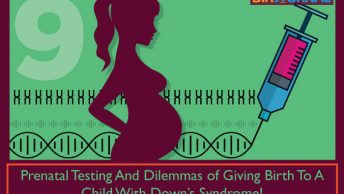“My daughter takes after me,” coos a mother. Every parent is proud of such “like mother, like daughter and like father, like son” links that form a strong bond between parents and children.
Well, that’s nothing to be proud of unless you are fit, reveals latest research. Wondering what fitness has to do with your children?
These parental links are not limited to the facial features or habits but also extend to the not so desirable weight or should we use the ugly word – fat. Researchers at the Peninsula Medical School in Plymouth have recently found a strong link in obesity between mothers and daughters and fathers and sons. Not mothers and sons or fathers and daughters.
A gender divide? No! The researchers do not think so. “It is highly unlikely that genetics is playing a role in the findings, as it would be unusual for them to influence children along gender lines.”
The results of this research are based on a study conducted on 226 families. The study was meant to investigate if childhood obesity was environmental as opposed to genetic. This was done by checking the BMI of parents and their five-year-old children.
The surprising finding was that the BMI of mothers and daughters and fathers and sons was linked. While the mother’s BMI had a significant effect on the BMI of her daughter, it did not have a significant effect on the son’s BMI. Similarly, a son’s BMI is similar to that of the father.
It was found that obese fathers were six times more likely to have obese sons, and the risk of a daughter being obese at eight years of age is increased ten-fold if the mother is obese. In both the cases, the opposite sex children were not affected.
But what is BMI? It is the body mass index that gives a more accurate reflection of body fat. A person with a BMI of 30 or more is said to be obese. Excess weight is no longer a perfect indication of obesity because extra weight does not always mean excess of fat. In many people, muscle mass weighs more than the fat tissue. For example, athletes who are muscular may weigh more than non-athletes of the same height and age. Although, they may seem obese on the weighing scale, they may not actually be fat and their fat mass is small.
Although, researchers are still not at a stage where they can completely discount the genetic factors, this study suggests a link between environmental factors and weight gain. The reason for this line of thinking is that, if this inheritance has something to do with the genes, it may not be gender specific and children of both sexes could be affected.
In fact, researchers term this the “behavioral sympathy,” where children happen to subconsciously follow the same sex parent’s lifestyle and develop the same habits, which could lead to them becoming “just like their mother or father.” A son tends to copy the father’s lifestyle, whereas a daughter copy’s the mother’s lifestyle.
The aim of the current study was to demonstrate that childhood obesity is related to environmental influences and not genetic ones. The only thing that researchers are still not clear about is the reason for these influences not transferring to the children of the opposite sex. Since they only examined the BMI of the parents in this study, they have plans of conducting future studies with larger groups of people and taking into consideration several other factors, to help them understand whether the child’s BMI will continue to follow the same trend and link to their parent’s BMI even into their adolescence and adulthood.
Although, these facts seem surprising initially, if you think about it, it is natural for children to imitate the eating habits and lifestyles of their parents. For a majority of boys, it is usually the father who is the role-model and girls want to grow up to be like their mothers and emulate them.
This study opens our eyes to how our children learn from us, and turn out to be so much like us. If you are an obese parent, now you know that you will have to cultivate a better lifestyle first, if you want your children to be fit and not fall into the same trap of obesity as you.












